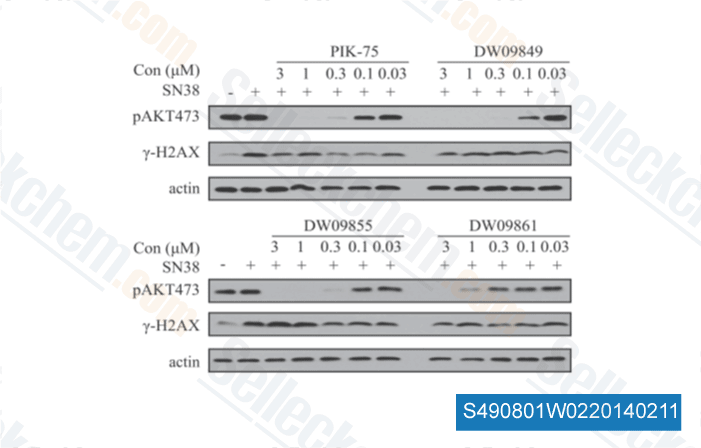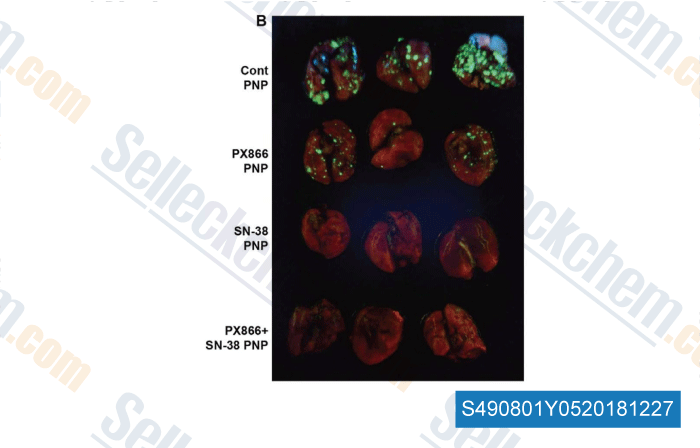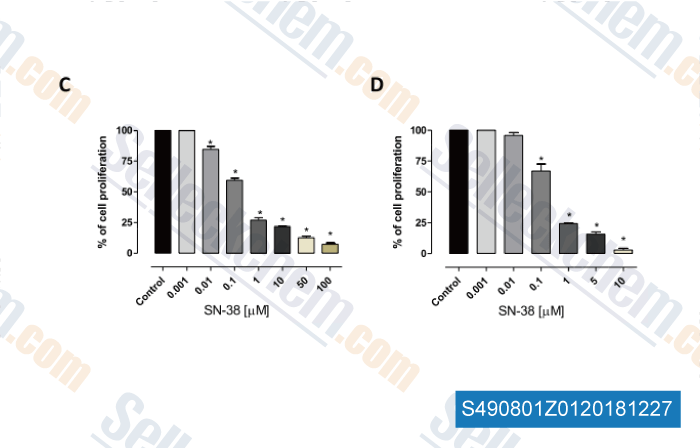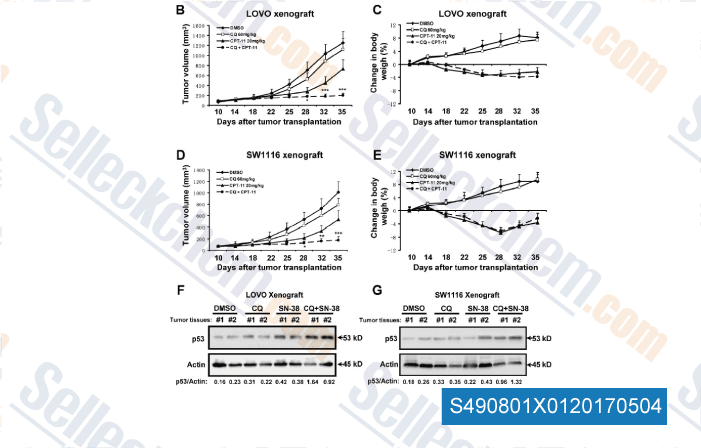|
Toll Free: (877) 796-6397 -- USA and Canada only -- |
Fax: +1-832-582-8590 Orders: +1-832-582-8158 |
Tech Support: +1-832-582-8158 Ext:3 Please provide your Order Number in the email. |
Technical Data
| Formula | C22H20N2O5 |
||||||
| Molecular Weight | 392.4 | CAS No. | 86639-52-3 | ||||
| Solubility (25°C)* | In vitro | DMSO | 20 mg/mL (50.96 mM) | ||||
| Water | Insoluble | ||||||
| Ethanol | Insoluble | ||||||
| In vivo (Add solvents to the product individually and in order) |
|
||||||
|
* <1 mg/ml means slightly soluble or insoluble. * Please note that Selleck tests the solubility of all compounds in-house, and the actual solubility may differ slightly from published values. This is normal and is due to slight batch-to-batch variations. * Room temperature shipping (Stability testing shows this product can be shipped without any cooling measures.) |
|||||||
Preparing Stock Solutions
Biological Activity
| Description | SN-38 (NK012) is an active metabolite of CPT-11, inhibits DNA topoisomerase I, DNA synthesis and causes frequent DNA single-strand breaks. SN-38 induces autophagy. | |
|---|---|---|
| Targets |
|
|
| In vitro | SN-38, a biological active metabolite of irinotecan hydrochloride (CPT-11). SN-38 causes the strongest inhibition of DNA topoisomerase I, followed by CPT and then CPT-11. CPT-11 dose dependently shifts the position of relaxed DNA in the direction of nicked DNA, but SN-38 and CPT shows no effect on the position of relaxed DNA. SN-38 dose-dependently and time-dependently inhibit DNA synthesis. Respective IC50 values of SN-38, in DNA synthesis is 0.077 μM. The inhibitory effect of SN-38 on RNA synthesis is less than that on DNA synthesis and it does not inhibit protein synthesis. SN-38 caused frequent DNA single-strand breaks in P388 cells. [1] |
|
| In vivo | After oral dosing, peak SN-38 concentrations occurrs within 1 h, and the The percent unbound SN-38 lactone in murine plasma at 1000 ng/mL is 3.4 +/- 0.67%, whereas at 100 ng/mL the percent unbound is 1.18 +/- 0.14%. SN-38 lactone AUCs in micebearing human neuroblastoma xenografts are greater than in nontumor-bearing animals. [2] |
Protocol (from reference)
| Kinase Assay: |
|
|---|---|
| Cell Assay: |
|
| Animal Study: |
|
References
Customer Product Validation

-
Data from [J Pharmacol Exp Ther, 2014, 348(3), 432-41]

-
Data from [Data independently produced by , , J Control Release, 2018, 275:85-91]

-
Data from [Data independently produced by , , Cancer Lett, 2017, 411:35-43]

-
Data from [Data independently produced by , , Free Radic Biol Med, 2017, 104:280-297]
Selleck's SN-38 has been cited by 75 publications
| Combined KRAS-MAPK pathway inhibitors and HER2-directed drug conjugate is efficacious in pancreatic cancer [ Nat Commun, 2024, 15(1):2503] | PubMed: 38509064 |
| A functional personalised oncology approach against metastatic colorectal cancer in matched patient derived organoids [ NPJ Precis Oncol, 2024, 8(1):52] | PubMed: 38413740 |
| Colorectal Cancer Organoid-Stroma Biobank Allows Subtype-Specific Assessment of Individualized Therapy Responses [ Cancer Discov, 2023, 13(10):2192-2211] | PubMed: 37489084 |
| Colorectal Cancer Organoid-Stroma Biobank Allows Subtype-Specific Assessment of Individualized Therapy Responses [ Cancer Discov, 2023, 13(10):2192-2211] | PubMed: 37489084 |
| Personalized drug screening in patient-derived organoids of biliary tract cancer and its clinical application [ Cell Rep Med, 2023, 10.1016/j.xcrm.2023.101277] | PubMed: 37944531 |
| "Proteotranscriptomic analysis of advanced colorectal cancer patient derived organoids for drug sensitivity prediction" [ J Exp Clin Cancer Res, 2023, 42(1):8] | PubMed: 36604765 |
| Unraveling Colorectal Cancer and Pan-cancer Immune Heterogeneity and Synthetic Therapy Response Using Cuproptosis and Hypoxia Regulators by Multi-omic Analysis and Experimental Validation [ Int J Biol Sci, 2023, 19(11):3526-3543] | PubMed: 37496994 |
| Spatial and clonality-resolved 3D cancer genome alterations reveal enhancer-hijacking as a potential prognostic marker for colorectal cancer [ Cell Rep, 2023, 42(7):112778] | PubMed: 37453058 |
| Drug-repurposing screen on patient-derived organoids identifies therapy-induced vulnerability in KRAS-mutant colon cancer [ Cell Rep, 2023, 42(4):112324] | PubMed: 37000626 |
| Improving the response to oxaliplatin by targeting chemotherapy-induced CLDN1 in resistant metastatic colorectal cancer cells [ Cell Biosci, 2023, 13(1):72] | PubMed: 37041570 |
RETURN POLICY
Selleck Chemical’s Unconditional Return Policy ensures a smooth online shopping experience for our customers. If you are in any way unsatisfied with your purchase, you may return any item(s) within 7 days of receiving it. In the event of product quality issues, either protocol related or product related problems, you may return any item(s) within 365 days from the original purchase date. Please follow the instructions below when returning products.
SHIPPING AND STORAGE
Selleck products are transported at room temperature. If you receive the product at room temperature, please rest assured, the Selleck Quality Inspection Department has conducted experiments to verify that the normal temperature placement of one month will not affect the biological activity of powder products. After collecting, please store the product according to the requirements described in the datasheet. Most Selleck products are stable under the recommended conditions.
NOT FOR HUMAN, VETERINARY DIAGNOSTIC OR THERAPEUTIC USE.
